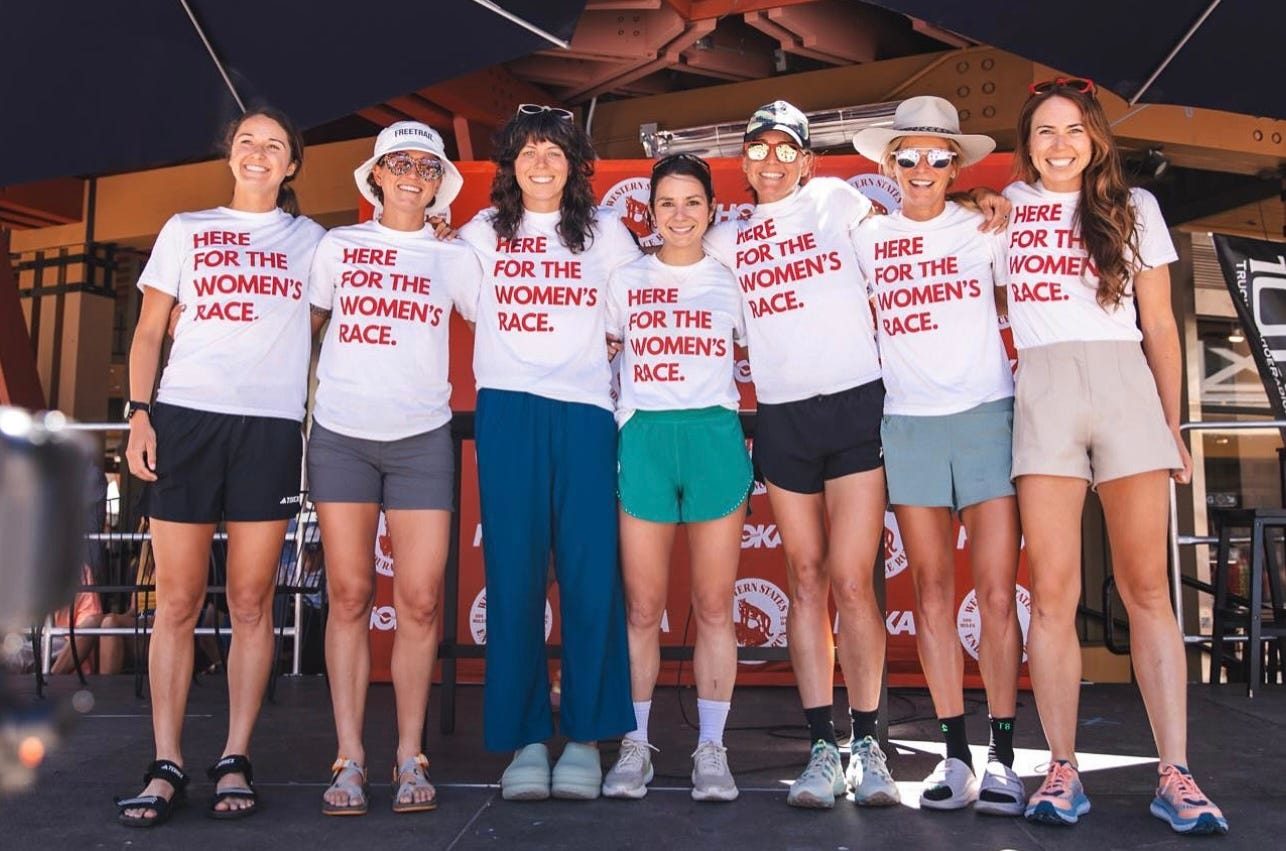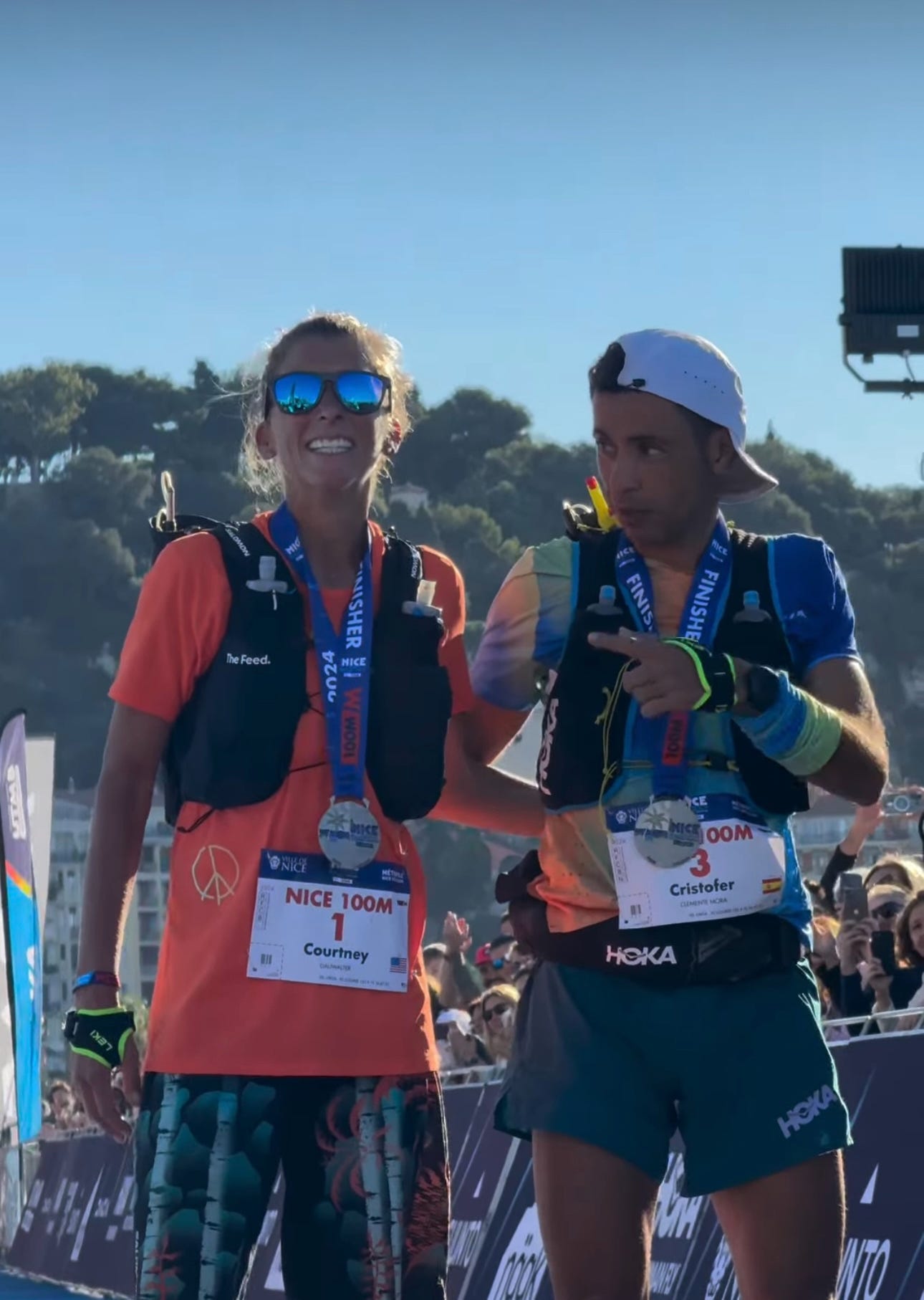The quest to get more women into trail running
How a simple white T-shirt ignited a movement to diversify the trails

Globally women’s sports are on the rise, enjoying record viewership, attendances and overall popularity.
But trail running is lagging behind.
On average, just 10% of starters at 100 mile trail races are women.
This lack of representation has inspired a movement spearheaded by women to drive change and ensure that trail running is reflective of society as a whole.
After all, the few women who are lining up for these premier ultra-marathon races are shattering records and defying stereotypes.
Take Courtney Dauwalter, the American ultra-marathon superstar who in 2023 became the first person to win three prestigious 100 mile races in the same year. Dauwalter routinely beats men to finish in the overall top-10 of most races.
Add Katie Schide’s record-breaking 2024 exploits UTMB Mont-Blanc and impressive win at Western States earlier, one quickly sees there is no shortage of talent within the women’s field despite them being underrepresented in ultra distances.
“Here for the women’s race”
In June, a group of women, members of the Professional Trail Runners Association (PTRA) turned up at Western States 100 in California, USA with 300 white T-shirts for sale with the words “Here for the women’s race,” emblazoned in red across the chest.
“At Western States, there were just 98 women on the start line and we wanted to cheer our faces off for them,” says Corinne Malcolm, a professional trail runner, member of the PTRA and trail commentator.
The T-shirt campaign was born out of frustration due to the lack of coverage of women’s trail races during live broadcasts and streams.
Malcolm was convinced that she would be carting most of the T-shirts back home in her truck, but the opposite happened.
“We should have printed 600 T-shirts as we ended up not having enough stock to meet the demand,” Malcolm says.
“We had one extra-large T-shirt left and this very petite runner said she needed it. So we cropped it for her right on the spot.”
The campaign has taken on a life of its own. Throughout the year the T-shirt - which is available online - has been spotted at major trail races donned by children, spouses, partners as well as women trail runners.
Funds raised through initial T-shirt sales and other merchandise have been used to establish the Women’s Trailrunning Fund (WTF). For 2024-2025, the fund plans to issue out $25,000 in grants to media-themed projects who will produce diverse, undertold stories that increase the visibility of female runners who are often overlooked in the world of trail and ultrarunning.
“The desired outcome is that women will see that film, YouTube series, hear that podcast and identify with it and be inspired to get into trail running,” Malcolm says.
“We know the power of representation and through WTF we have brought women together and can use these funds to give back to different communities while growing our sport.
“We realise that we are good fundraisers and it’s exciting to have a group of women working together to make a positive impact, far greater than any of us could have had individually,” she adds.
Applications for the initial round of WTF grants are now open until 13 Dec. Funds will be distributed early in 2025.
What started off as a group of women upset about media coverage in trail races has morphed into a global movement to transform the sport across gender, race and sexuality.
Gender parity is profitable business
The bid to get women into trail running is more than just a noble attempt at balancing the scales, it is also a profitable venture.
Trail is a young sport with a huge potential for growth.
A shift from predominantly white male participants to getting in more women and other marginalised communities can significantly increase the market size.
This in turn would lead to more race entries, stronger competition, more engaged audiences and larger prize pots.
In trail, equal prize money has been a long-standing tradition in major races.
As a result, everyone involved in the sport, from runners to race organisers, sponsors, kit manufactures and media partners stands to benefit financially from a more inclusive environment.

Breaking down societal barriers
While the WTF is a community-based initiative, there is organisational work ongoing to try to make a change.
UTMB Group, who run a circuit of over 50 trail races around the world, is focused on collaborating with stakeholders like PTRA and monetary partners to design programs that look after women already in the sport and to attract newcomers.
In 2023, UTMB Group introduced a pregnancy policy which includes deferral and priority entry guidelines for athletes who are pregnant, have a partner who is pregnant, and those who are adopting or birthing via surrogacy.
For events with an entry lottery, the policy states that women will be given a full refund and priority entry to be used within five years for races in the 50 km, 100 km and 100 mile categories, and within two years for 20 km races.
For all other events, women who become pregnant after race registration can defer entry for up to two years for the same race or receive a full refund. Partners of pregnant women as well as parents that are adopting or birthing via surrogacy have the option of deferring their entry for up to two years and receive a full refund.
Demystifying trail running and addressing information gaps is a challenge that the sport faces when it comes to enticing prospective runners.
“We are in contact with a lot of women and realise that many lack basic information about trail running,” says Marie Sammons, a professional trail runner with over 20 years experience who also works as a team and elite athletes manager at UTMB Group.
“Often I get asked if one needs to run the entire race which often has tough terrain and unforgiving elevation.
“Most women simply don’t realise that even top athletes don’t run the entire time and that walking is part of trail running.”
Safety is another key consideration for women. Worries about getting lost on trails, encountering wildlife and strange men while alone up in the mountains are valid concerns.
According to Sammons, great care goes into ensuring that courses are clearly marked and pre-race briefings are conducted to address any concerns runners might have.
Outside of competitions, women are encouraged to find trail running communities with like-minded people. The sense of belonging goes a long way in combating loneliness and provides companionship on training runs.
“We have a responsibility to educate women and provide the necessary information about proper and minimum equipment requirements so they can enjoy the sport safely,” Sammons says.
“We are equally engaging with men as allies. In homes, men have to leave room for women to take up hobbies. On the trails, men have to be careful and considerate of other runners around them.
“Most men are open-minded and understand the value of running alongside women, but not all of them,” she adds.
Initiatives implemented by UTMB Group in 2024 include the introduction of feminine hygiene products at aid stations as well as extra toilets for women.
Most importantly, for the first time this year, women enjoyed increased visibility at the start line of UTMB Mont-Blanc 100 mile race where an equal number, 40 women and 40 men lined up in the elite pen in a race that received unmatched global coverage.
For 2025, UTMB Group plans to continue recruiting more women into the sport as well focusing on developing those athletes who are already in trail, running shorter distances. The goal is to offer coaching and mentoring services to help women get to premier 100 mile races.
“As the sport gets more professional, we want more women to share in all the benefits that come with being part of a fast growing sport,” Sammons adds.
“We know that when you provide help and support to women and they go on to reach the podium at UTMB races, it can change their lives.”
While there is still a long way to go to achieve gender parity in 100 mile trail races, there is a collective push to ensure that more women feel welcome in the sport and have the tools to succeed and achieve their goals.




